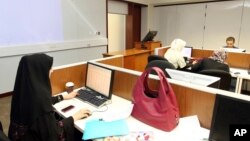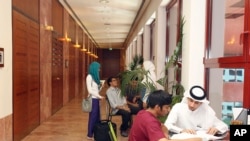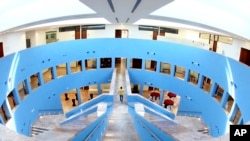A parade of radical Islamist clerics using the mosque at Qatar’s Education City to propagate religious intolerance - including demonizing Christians and Jews - is drawing mounting criticism from six American universities that maintain satellite branches on the sprawling campus located on the outskirts of the Qatari capital Doha.
All six universities — Georgetown, Northwestern, Texas A&M, Cornell, Carnegie Mellon and Virginia Commonwealth — have speech and expression policies on their home campuses in the U.S. which effectively prohibit calls for the annihilation of whole groups of people based on their religious affiliation or ethnicity, something preachers being hosted by the mosque are notorious for urging.
The roster of preachers at the mosque in Education City is overseen by the quasi-governmental Qatar Foundation founded by Sheikha Mozah bint Nasser, the second wife of the former emir of Qatar and mother of the current ruler. It includes Mudassir Ahmed, who urged Allah in his March 18 sermon at the mosque to “kill the infidels… Count them in number and do not spare one.”
Radical clerics regularly preach
An investigation by an American analyst has revealed that in the weeks before U.S. President Barack Obama visited the Gulf in April, other clerics well known for their incitement of religious hatred gave sermons at the Education City mosque.
On March 4, the mosque hosted Mohammed al-Arefe, a Saudi Arabian cleric.
In the past, he dubbed Shi’ite Muslims purveyors of “treachery” and “evil,” and has said “non-believers…must be killed” according to Human Rights Watch. “One’s devotion to jihad for the sake of Allah and one’s will to shed blood, smash skulls, and chop off body parts… constitute an honor for the believer,’ he proclaimed in 2012.
And on March 25 the Egyptian fundamentalist Omar Abdelkafi was the guest Friday preacher. He has described the Charlie Hebdo murders in Paris as “the sequel to the comedy film of 9/11,” in which he claims Muslims “played no part.”
Since its inauguration in March 2015, the Education City mosque has attracted increasing notice for hosting controversial militant preachers.
At odds with promise to combat radicals
"The U.S. schools must speak out," says David Weinberg an analyst at the Foundation for the Defense of Democracies, a Washington-based foreign policy group. He says he is surprised the mosque continued to host such radical preachers in the run-up to Obama's Gulf visit.
He argues the showcased preaching at the mosque violates a public pledge that Qatar’s government made to combat militant radical Islamist ideology.
In 2014, U.S. officials said Qatar has replaced its neighbor Saudi Arabia as the source of the largest private donations to the Islamic State group and al-Qaida affiliates.
"Conscientious students, faculty and other community members at these schools should spread the word and speak out in opposition to this dangerous development on campus," says Weinberg. He reports the Qatar Foundation’s newspaper encourages "community members" to attend services, has free buses to and from the mosque, and has emailed students to inform them the Friday sermons will be translated into English.
Northwestern University spokesman Storer H. Rowley told VOA, "Northwestern University does not have any control over the mosque or who may be invited to speak there. Northwestern University does not tell our NU-Q students where they should worship (or if they should at all)."
None of the other five universities responded to VOA requests for comment by publication time.
Students at the Education City campus are drawn from more than 50 countries, with many coming from other Gulf and Mideast states. Education City founder Sheikha Mozah has been lauded as a progressive force in the tiny and wealthy Persian Gulf emirate. She has campaigned for the poor and women to have access to education.
The emirate’s ruling family has been eager to leverage its oil and natural gas-based wealth into regional and international influence, and to establish Qatar as a modern state and Western ally.
But Qatar’s adherence to Wahhabism has thrown up contradictions, often challenging the ruling family to balance cultural conservatism and change. Many of the 2,000-member Qatari royal family are known to resent Sheikha Mozah’s clout and her leadership in trying to transition Qatar into a knowledge based economy, say analysts.
The campus presence of the six U.S. universities has prompted questions before. The University of Virginia considered starting a branch at Education City, only to pull out of talks after the school’s governing body raised concerns about academic freedom.
Critics question whether the financial support the six universities receive from Qatar, which according to a Washington Post report is likely a combined $320 million a year, is blinding them.
“Such generous, recurring payments give school administrators a powerful incentive to remain silent about the revolving door of hate preachers at the Education City Mosque,” argues Weinberg.
Last year, Northwestern art historian Stephen Eisenman questioned publicly whether the university should maintain a satellite campus, warning in a 6-page report that the faculty "enjoy limited academic freedom.”
And he wrote: “The ethics of establishing a campus in an authoritarian country are murky, especially when it inhibits free expression, and counts among its allies several oppressive regimes or groups.”
Asked by VOA whether the radical preaching at the Education City mosque adds to his concern, Eisenman responded. "If it is true that the government of Qatar is supporting anti-semitic or other hateful speech, it deserves to be called out on it. And if a university has entered into a contract with that government, it has a right, a duty in fact, to express its views about that support and reconsider its affiliation.”






